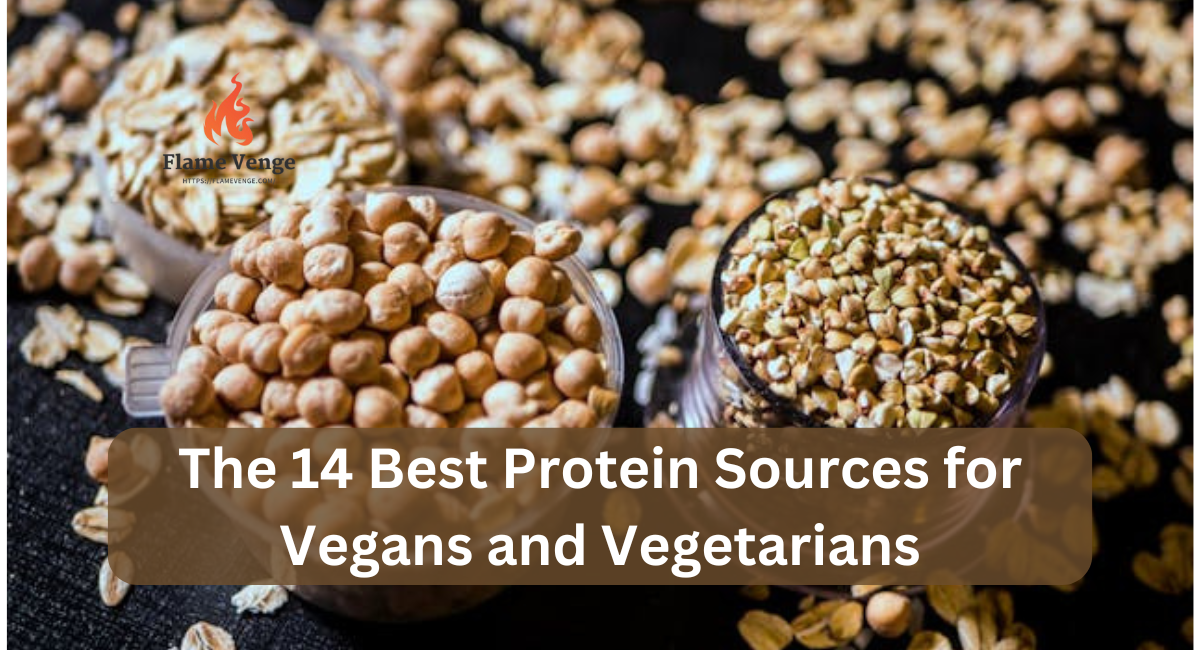Protein is important for our body because it helps fix muscles, keeps our immune system strong, and makes enzymes and hormones. For vegans and vegetarians, finding high-quality protein sources can be a bit challenging since they exclude meat, fish, and sometimes other animal products from their diets.
However, there are plenty of plant-based foods that provide ample protein. Here’s a detailed look at the 14 best protein sources for vegans and vegetarians.
1. Legumes
Lentils
Lentils are high in protein and can be used in many ways. About 18 grams of protein are contained in a cup of cooked lentils. They also contain fiber, iron, and folate, so they are good for you.
Chickpeas
Chickpeas, or garbanzo beans, are another excellent source of protein. A cup of cooked chickpeas offers about 15 grams of protein. They can be used in various dishes, from salads to hummus.
2. Beans
Black Beans
Black beans are very protein-rich, with about 15 grams in one cup of cooked beans. They are also high in fiber and can be included in many recipes, such as soups, stews, and burritos.
Kidney Beans
Kidney beans provide about 13 grams of protein per cup. They are a great addition to chili, salads, and casseroles.
3. Tofu and Tempeh
Tofu
Tofu, made from soybeans, is a staple in many vegetarian and vegan diets. A half-cup serving contains around 10 grams of protein. It is also rich in calcium and iron. Tofu can be grilled, stir-fried, or used in soups and salads.
Tempeh
Tempeh is made from fermented soybeans. It has a nutty taste and is firm. It boasts around 15 grams of protein per half-cup. Tempeh is also a good source of probiotics, which benefit gut health.
4. Edamame
Edamame, young soybeans, are a great snack or addition to salads and stir-fries. One cup of cooked edamame provides 17 grams of protein. They are also high in fiber, vitamins, and minerals.
5. Quinoa
Quinoa has all the proteins you need and gives you about 8 grams of protein in one cup when cooked. It’s also gluten-free and high in magnesium, iron, and fiber.
6. Seitan
Seitan is a food with lots of protein made from wheat gluten. It has about 21 grams of protein in 3 ounces, making it a good plant-based protein option. Seitan is chewy and can be used in many different dishes.
7. Nuts and Seeds
Almonds
Almonds have a lot of protein, with about 6 grams in every ounce (which is about 23 almonds)., But also have lots of good fats, vitamin E, and magnesium. They make a great snack or addition to meals.
Chia Seeds
Chia seeds are tiny but mighty in terms of nutrition. Two tablespoons contain 5 grams of protein, lots of healthy fats, fiber, and different vitamins and minerals.
8. Nutritional Yeast
Nutritional yeast has been turned off and often has B12 added to it, making it a great choice for people following a vegan diet. It has a cheesy flavor and provides 8 grams of protein per 2 tablespoons. It can be spread on popcorn or pasta or used in sauces.
9. Hemp Seeds
Three tablespoons of hemp seeds give about 10 grams of complete protein, which makes them a great source. Additionally, they are loaded with omega-3 and omega-6 fatty acids. Hemp seeds can be spread on salads, added to yogurt, or blended into smoothies.
10. Spirulina
Spirulina is a type of blue-green algae that has a lot of protein, with 4 grams of protein in each tablespoon. It also has important vitamins, minerals, and antioxidants. You can put it in smoothies or take it as a supplement.
11. Green Peas
Green peas are more than just a side dish; they are a great protein source, with about 8 grams per cup. They are also high in fiber, vitamins A, C, K, and several B vitamins. They can be added to soups, stews, or pasta dishes.
12. Oats and Oatmeal
Oats are a good choice because they are healthy and can be used in many ways. A cup of cooked oats has around 6 grams of protein. They also have a lot of fiber, which can help digest food and keep blood sugar levels steady. Oats can be enjoyed as oatmeal, added to smoothies, or used in baking.
13. Amaranth and Teff
These ancient grains are gluten-free and high in protein. One cup of cooked amaranth contains about 9 grams of protein, while teff offers 10 grams per cup. Both grains are also rich in fiber, iron, and magnesium. They can be added to oatmeal, baked treats, or served as a side dish.
14. Soy Milk
Soy milk is a common milk substitute that is very protein-rich. One cup contains about 7 grams of protein. It is also often fortified with calcium, vitamin D, and vitamin B12. Soy milk can be used in smoothies, cereal, or even by itself.
Conclusion:
Incorporating these protein-rich foods into a vegan or vegetarian diet ensures essential nutrient intake for health and vitality. Mixing and matching different sources like legumes, beans, tofu, tempeh, nuts, seeds, and ancient grains allows you to eat different foods and have a healthy diet.
These plant-based options provide ample protein, fiber, vitamins, and minerals, supporting muscle repair, immune function, and overall well-being without relying on animal products. Enjoy a varied diet to meet your protein needs and maintain optimal health.
READ ALSO:
The 12 Best Diets for Men at Every Age

